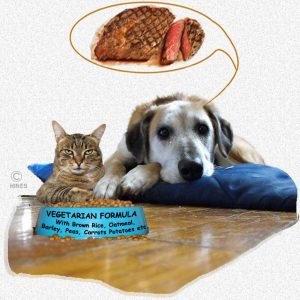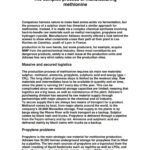I Love You – But I Don’t Love You The Way You Are
The Vegan’s Paradox – To Vegetize or Not To Vegetize
Ron Hines DVM PhD
 More About DCM Dilated Cardiomyopathy
More About DCM Dilated Cardiomyopathy
I have been a vegetarian most of my life. It’s my penance for choosing a profession that brings pet illness and death to my doorstep far too frequently. I don’t wear my eating habits as a badge. I don’t proselytize, and I don’t feel an ounce better than my meat-eating neighbors because of my chosen lifestyle. I only bring it up now because I think those many years of declining to kill anything for personal gratification entitle me to pen this article.
Perhaps you made that choice as well – if so fine, good and welcome. But your dog and your cat’s anatomy, genetics, nutritional needs and, as importantly, its desires are not the same as yours or mine. I want to take some time to be an advocate for your cat and dog and tell you the things they would like to explain to you if they could. Perhaps they did tell you, but you just weren’t listening.
Are You Going To Tell Me That One Cannot Construct A Vegetarian Diet For My Dog or Cat That Will Meet Its Nutritional Needs?
No.
For dogs, it can be done. For cats, it can be done theoretically and perhaps even in practice – like climbing Mount Everest in the winter or journeying to the moon.
Pet food manufacturers are not ones to leave a potential source of revenue untapped. They know that ~ 5% of Canadians, ~2.5% of US Americans and ~4% of the UK are vegetarians and that most of us have dogs and cats. They also know that most of us folk are well-educated with substantial disposable income, and that for philosophical reasons many of us are motivated to consider feeding our pets a diet that contained no animal ingredients. However, these profit-driven entities still have a long way to go. The majority of their no-meat pet entrées are deficient in vital nutrients. (read here) The danger of carbohydrate glut, metabolic derangement and potentially hazardous additives is ever-present. (read here & here)
When the primary motivation is high profits, as it is in specialty pet foods, most anything is achievable through manipulation or slight-of-hand. And most any claim can be offered to the public. Chemists can synthesize just about everything in today’s plastic world – or cook up an approximation in some flask using trained (genetically engineered) microbes (such as the amino acids, lysine and methionine) – or produced it from toxic petrochemicals (e.g. methyl mercaptan-propionaldehyde). A genetically engineered, soylent green brew. read here:
So, What’s Your Beef With Me Feeding My Dog And Cat A Plant-based Diet Anyway? That’s So….. Uncool Of You!
I am less concerned whether you can successfully vegetize your pet than whether you ought to. A lot of morally repugnant things can be done without negative health effects. The problem is that turning a carnivore into a herbivore is a form of animal cruelty – a deprivation to a unique animal soul and desires done solely to satisfy ones own selfish ego. Why would you consider doing that to a kindred soul that loves and trusts you?
You cannot have true compassion for animals without true empathy for all living things as they were created, not as you would have liked them to be created. You cannot have true empathy without acceptance of your dog and cat’s “self” – its “being” and its innate desires. You cannot have true foundational love for animals without understanding, and you can’t have understanding when you deny your pet’s basic nature.
Look at your cat or dog’s teeth. Whoever or whatever you exalt, created them for a purpose – to consume their prey. No one can tell you why that is, no one can explain why predatory and prey are fundamental elements of Nature and no one can justify it – certainly not I.
Would an animal designed to eat meat be repulsed by meat, or would it crave meat? How about a vegetarian animal like a cow? How might it feel if you offered it meat rather than hay? Might it be able to survive on meat? Perhaps. Might your dog or cat be able to survive on plants? Perhaps. Would it be humane or compassionate to do either? Would it be an act of love or of selfishness to force either animal to consume what is not in their nature? Might vegetization of carnivores be a simplistic solution to a misstated problem – a creepy experiment to satisfy ones own personal vanity? Is it any less a form of animal abuse and experimentation than these? 

India has more vegetarians than the rest of the world combined (~38%). But their motivation is quite different from yours. Indians, see vegetarianism as a form of ritual cleanliness and purity – not as a social justice movement as most Western vegetarian/vegans do. Animals can be exploited in various ways: wagered upon in bull rings, horse races and cock fights, paraded before the public for amusement, used for draft and clothing. But is vegetization of a dog or cat any less of an exploitation of animals? In my mind vegetizing carnivores it is no different from the older forms of animal experimentation and exploitation. It can be done, but so can an experiment that allows a mouse to breathe underwater. In my mind, it is worse than most animal experimentation because nothing good comes of it. No one learns anything that might benefit one dog, one cat or one human being.
How Did We Get Here?
The process that got us here began long ago, as an offshoot of intensive animal agriculture. That was when pet owners were first told by big feed and slaughterhouse corporations that it was OK to feed a baked “chow” or kibbled pellet to your dog and cat (re Purina Mills) and when the big Chicago slaughterhouses found canned dog food a convenient way to dispose of their waste. (read here) Once pet owners bought into that, it became acceptable to feed dogs and cats products that had no relationship whatsoever to what dogs and cats had consumed for millennia. Once you no longer believed that your dog or cat needed its natural diet or even remembered what it was, it was only a small step farther to suggest that it could prosper eating most anything. Animal protein (meat) is more expensive than plant protein. So, those corporations found it advantageous to get you to believe that there was no difference between the two and that pets were mindless cartoon creatures that could be fed the same nondescript slop day after day, year after year. It was conveniently forgotten that taste, mouth feel, variety, chewing and gnawing for dental health, and variety to enrich their lives were of any importance. Aiding these corporations was our migration to large cities, our day-to-day separation from Nature and the two-worker family. They know that folks get home tired, without the time and energy to cook for their pets. Today’s population are programmed to hurry up, get online, text their friends, click on cable TV or YouTube 
Well, I Read Somewhere That Some Dog Lived To Be 189 Dog-Years Old On A Vegan Diet
You could choose to believe that. Ripley’s did. Feeding a diet high in rice and lentils might actually extend your dog or cat’s life – through partial starvation (caloric restriction) and a chronic methionine deficiency. But to me, providing your pet with a lifetime filled with contentment and pleasure is considerably more important. An exceptionally long life has nothing to do with a happy life.
How Dare You Write Subversive Things Like This! Everyone Knows We Vegetarians Love Our Pets More Than Meat Eater’s Do!
You can find plenty of folks that claim that. They even publish half-baked and fee-based articles in Scientific Journals: 
Your job is to love and protect your pet and to satisfy its emotional needs. To accept it as God made it, not as you might wish it had been made. My job is to try to understand their physical and psychological needs. You may be vexed about why the World is as it is. I am. But don’t take that frustration out on your pets. Don’t make them suffer for something they had nothing to do with. You cannot right a wrong with another wrong. I know you are conflicted, or you wouldn’t have read this far; but don’t make your pet suffer to solve a personal moral dilemma. PETA and other professional indignants will question my sincerity and veracity. They might remind you that I am “controversial“. They might tell you that I am morally “impure” because I worked within the research community at the National Institutes of Health where animal experimentation is common. All of that is true. Those folks hold rigid, lock-step opinions. Like all totalitarian ideologies, PETA and groups similar to them, have an inclination toward book-burning, violence and intimidation when your conclusions do not entirely agree with theirs. Few of them will have bothered to read this far and fewer still to consider if political correctness and self-centered egotism rather than empathy for animals motivate their suggestions on what you should feed your dog or your cat. They also lead the pack when it comes to advocating for the sterilization of infant and immature animals. (read here) If a single pet owner like you is warned away from the abomination of vegetizing their beloved dog or cat it’s been worth the time it took me to write this webpage.
You are on the Vetspace animal health website
Visiting the products that you see displayed on this website help pay the cost of keeping these articles on the Internet.




